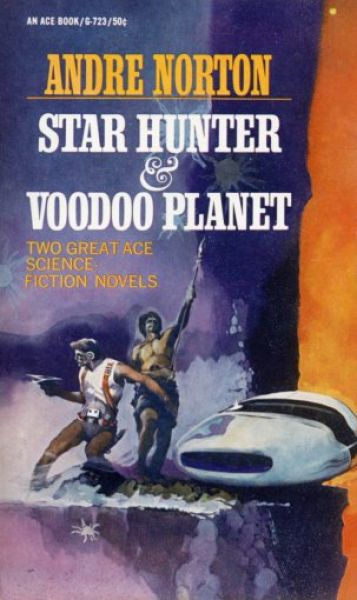Interstellar Confidence Game
Star Hunter
By Andre Norton

27 Feb, 2015
0 comments
I am reviewing 1961’s Star Hunter out of sequence because in the original ad for Andre Norton novels, the one that inspired this series, Star Hunter is listed as part of an omnibus edition also containing Voodoo Planet. That novel was published in 1959. This review and the one that follows constitute a review of the omnibus Star Hunter & Voodoo Planet. In cases like this, the publication date of the earlier work is the one I am going to use [1].
Discussion of one of the more interesting aspects of this book requires a pretty major spoiler, so … SPOILER WARNING!
~oOo~
Space pilot Ras Hume has good reason to want revenge on the Kogan-Bors-Wazalitz shipping line. Not only did the drug-sodden Tors Wazalitz (the sort of spoiled rich kid and heir who gets killed generating the protagonist’s tragic back-story) cause the spaceship crash that cost Hume a hand and very nearly his life — the company then tried to blacklist Hume as a reprisal for Wazalitz’s death. (This was of course utterly unfair, as Wazalitz himself had created the disaster.)
A transfer to the Out-Hunters Guild allowed Hume to keep flying and now, years later, chance has offered him the opportunity for payback.
Several years previous, the spaceship Largo Drift was lost in deep space. All aboard are presumed dead, including Gentlefem Tharlee Kogan Brodie and her son Rynch. If either had survived, they would be the rightful owners of a third of the Kogan-Bors-Wazalitz line. Their rights would be worth a fortune.
Hume has no evidence that either mother or son survived the calamity, but what he does have is a lifeboat from the Largo Drift that was found on the desolate world of Jumala. Hume has a proposition for Wass, the criminal genius of five stellar systems: find someone who they can pass off as Rynch and they can use him to gain access to the Kogan riches.
Hume even has a candidate in mind: young Vye Lansor. What Wass can bring to the game, in addition to his criminal expertise and riches, is access to a conditioner, a device that can mold Lansor into a passable Rynch.
The plan begins to fall apart almost as soon as it is put into motion: Lansor, whose opinion about the plan is never sought, is kidnapped, brainwashed and dumped on Jumala for Hume to pretend to stumble over while leading a party of hunters on that otherwise uninhabited world. Unfortunately, not only is Lansor a lot more resistant to the brainwashing than anyone expected but it turns out the supposedly uninhabited world is home to … something and that something has noticed the trespassers. And isn’t pleased.
Herded towards captivity and possible death, Hume will have to abandon his grand scheme and team up with his unwilling cats-paw if either is to survive the things that lurk unseen on Jumala.
This is a fairly stock Norton plot, the one in which it turns out that an empty world isn’t half as empty as advertised. (Though you’d think that no one in her fictional worlds would trust such advertisements, given that so many planets are littered with relics of past civilizations and portals to other worlds.) She manages to move the plot along quickly (experience helps!) and the book is short enough that the reader doesn’t have time to get bored.
While Wass is very highly placed, both Hume and Lansor are the sort of down and outers so often seen in Norton’s books. In some ways, this novel reads like a sketch for her later, more successful, Night of Masks.
Although women do not play a major role in the plot, at least we get some sort of explanation for the feminine absence:
“You have a choice of survivor? The Gentlefem?“
Hume shook his head. “The boy. He was bright, according to the stories since, and he would have the survival manual from the ship to study. He could have grown up in the wilds of an unopened planet. To use a woman is too tricky.”
“You are entirely right.
That’s the full explanation, by the way.
Towards the end of the book we learn that the galactic authorities are not so much hostile to the idea of entrapment as they are extremely enthusiastic about it. Not only that, but the authorities don’t mind if innocent third parties are swept into the plot. Those third parties can then sue the criminals for damages; the lawsuit will be another lever to use against otherwise untouchable criminals like Wass. I can see the advantages from the government’s point of view but all this is very hard on victims like Lansor.
Although the edition listed in the ad was an omnibus, I downloaded this novel from Project Gutenberg. Given the nature of my next mini-review, I am just as happy that I don’t own a paper copy of the omnibus.
1: Although perhaps I should use the publication date of the omnibus…? No, I made my choice and I am sticking with it. Decisiveness would be my middle name, if I didn’t already have a good one.
